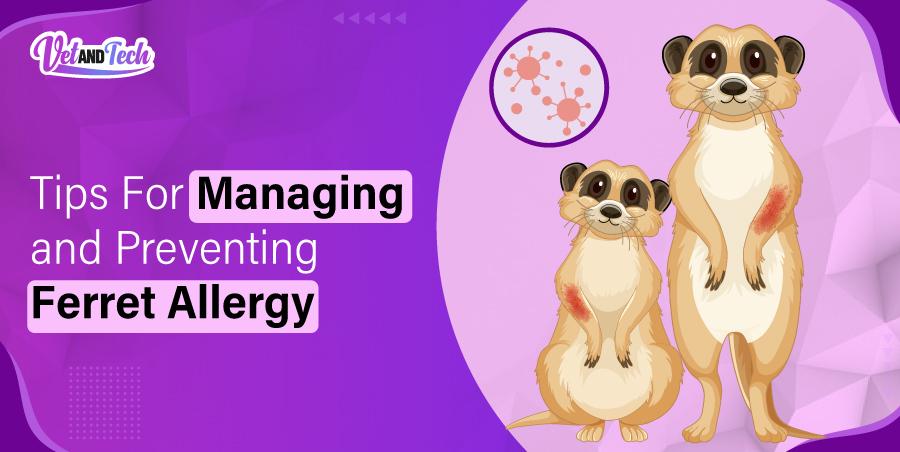Tips For Managing and Preventing Ferret Allergy
Living with a furry companion is a joyous experience for many. However, for some people, the love for their pet ferret may have a downside - ferret allergy.
Allergic reactions to ferrets can range from mild discomfort to more severe respiratory symptoms. Apparently, it poses a challenge for ferret owners who enjoy living with their pets without compromising their health. However, with proper management and preventive measures, it is possible to coexist harmoniously with these adorable creatures.
This guide will explore practical tips for managing and preventing ferret allergies. We will provide valuable insights to help you create a safe and allergy-friendly environment for you and your ferret companion.
So keep yourself engaged until the conclusion!
Understanding Ferret Allergy
Ferret allergic reactions can be a source of discomfort and inconvenience for both ferret owners and individuals who come into contact with these furry companions.
To effectively manage and address this problem, it is essential to
- Understand its causes
- Recognize common symptoms
- Differentiate it from other respiratory conditions
Let’s discuss these concerns in detail.
What Causes Ferret Allergies?
Primarily, these allergies are triggered by proteins found in a ferret's urine, saliva, and dander. When these proteins become airborne or come into contact with an individual who is allergic to ferrets, they can cause a reaction. Some individuals may be specifically allergic to the proteins found in ferret urine.
On the other hand, some may react to multiple allergens present in the ferret's environment.
Simply put, allergic reactions can vary in severity from person to person.
What are the Common Symptoms of Ferret Allergic Reactions?
The symptoms of ferret allergy can manifest in various ways and may range from mild to severe.
The most common signs are as follows.
- Sneezing and nasal congestion
- Itchy skin or dermatitis
- Itchy or watery eyes
- Coughing or wheezing
- Shortness of breath or difficulty breathing
- Runny or stuffy nose
- Skin rashes or hives upon contact with a ferret
These symptoms can occur shortly after exposure to a ferret or spending time in an environment where ferrets live.
People with pre-existing respiratory conditions, such as asthma, may experience severe symptoms when exposed to ferret allergens.
Differentiating Between Ferret Allergies and Other Respiratory Conditions
Differentiating ferret aversions from other respiratory conditions can sometimes be challenging, as the symptoms may confuse.
However, there are a few key factors that can help distinguish ferret allergy:
- Timing of symptoms
Allergic reactions to ferrets typically occur shortly after exposure.
Contrarily, respiratory infections or other conditions may have a more gradual onset.
- Triggers
If symptoms are consistently worsened by contact with ferrets or their environment, it means the individual has gotten an allergic reaction rather than a non-allergic respiratory condition.
- Response to treatment
Ferret allergic reactions develop more severe or resolve with allergy management, such as using allergy medications.
On the other hand, respiratory infections may require specific medical interventions.
If there is uncertainty regarding the cause of respiratory symptoms, it is advisable to consult with a healthcare professional or an allergist for a proper evaluation and diagnosis.
Diagnosing Ferret Allergy
Ferret hypersensitivity or allergies can cause discomfort and health issues for humans as well as their pets.
If you suspect that you or someone at home is allergic to ferrets, seeking veterinary help for proper diagnosis and management is crucial.
Here are the key steps involved in diagnosing ferret aversions:
Seeking Veterinary Assistance
When dealing with a suspected ferret allergy, the first step is to consult a veterinarian specializing in small animals or exotic pets.
They have the expertise and experience to diagnose and provide appropriate guidance.
During the consultation, the person allergic to ferrets must inform the veterinarian about the symptoms experienced and triggers.
Allergy Testing Methods for Ferret Allergies
- Skin prick test
Skin prick or intradermal tests involve placing a small amount of allergen extracts. The vet places ferret dander or saliva on the skin and pricks it with a needle.
If an individual is allergic, a localized allergic reaction, such as redness or swelling, will occur at the test site.
- Blood tests
Blood tests can measure the levels of specific antibodies, known as immunoglobulin E (IgE), that are produced in response to allergens.
After lab analysis of blood samples, health professionals can evaluate whether an individual has specific IgE antibodies to ferret allergens.
- Elimination diet
Sometimes, a veterinarian may recommend an elimination diet. It helps them determine if food allergies contribute to the symptoms.
Basically, it involves removing certain foods from the ferret's diet and gradually reintroducing them while monitoring for any allergic reactions.
Besides everything, diagnosing ferret allergy can be challenging. This can be due to the limited availability of ferret-specific allergen extracts for testing.
Additionally, some individuals may have mixed allergies, reacting to multiple allergens present in the ferret's environment.
Once a diagnosis of ferret allergies is confirmed, the veterinarian can provide guidance on.
- Managing allergies
- Minimizing exposure to allergens
- Implementing appropriate treatment options
This may include lifestyle modifications.
How to Manage Ferret Allergic Reactions?
Ferret’s allergies are manageable by taking the following measures.
Minimizing Exposure to Allergens
This is possible by ensuring the following precautions.
- Regular cleaning and maintenance of the ferret's living area
Clean the ferret's cage, bedding, and surrounding areas regularly. Thus, you can reduce the buildup of allergens, such as dander and saliva.
Additionally, use pet-friendly cleaning products and wash bedding in hot water to remove allergens effectively.
- Using high-quality air purifiers and filters
Invest in HEPA filters and air purifiers to help capture and remove allergens from the air.
Place them strategically in areas where the ferret spends the most time for the best results.
- Creating designated allergy-free zones in the home
Designate certain home areas, such as bedrooms or specific rooms, as allergy-free zones.
This can provide a retreat for individuals with ferret allergies, minimizing their exposure to allergens in those areas.
Personal Hygiene and Cleanliness
It includes the following measures.
- Frequent handwashing after handling the ferret
Wash hands thoroughly with soap and water after handling the ferret.
This would help remove allergens from the skin, reducing the risk of their transformation to the face or eyes.
- Wearing protective clothing or gloves if necessary
Consider wearing protective clothing if handling the ferret or cleaning its living area exacerbates allergies.
Try to wear long sleeves, gloves, or a face mask, to minimize direct contact with allergens.
Dietary Considerations
Dietary considerations to manage ferret allergy include
- Identifying and eliminating potential allergens from the ferret's diet
Certain food ingredients can contribute to allergic reactions in ferret owners.
Therefore, seek help from your vet to identify potential allergens in the ferret's diet.
Eliminating such foods can reduce the risk of exposure.
- Consulting with a veterinarian for appropriate dietary modifications
If dietary changes are necessary, consult a veterinarian. Thus, you can ensure the ferret's nutritional needs are met while addressing allergies.
Your vet will recommend suitable alternative foods or supplements to maintain your ferret's health.
Medications and Treatments
Last but not least, if you’re allergic to ferrets, you can manage the problem through medication and treatment.
- Over-the-counter antihistamines for mild symptoms
For mild allergic symptoms, over-the-counter antihistamines may provide temporary relief.
However, consulting with a healthcare professional or veterinarian is essential.
They would help you determine the appropriate dosage and suitability for use in ferret allergies.
- Prescription medications for more severe allergies
In cases of more severe allergic reactions, prescription medications such as nasal sprays or oral medications may alleviate symptoms.
Primarily, these medications help reduce inflammation and control sensitivity.
- Immunotherapy options for long-term management
Immunotherapy, such as allergy shots or sublingual immunotherapy, may be considered for the long-term management of ferret allergy.
These treatments involve gradually desensitizing the immune system to specific allergens.
As a result, they reduce the severity of allergic reactions over time.
How to Prevent Ferret Allergy?
Ferret aversions can be a challenge to manage, but there are steps you can take to prevent allergies from spreading or minimize their impact.
These include
- Selecting hypoallergenic bedding and toys
- Regular grooming and bathing practices
- Considering alternative pets for individuals with severe allergies
- Educating family members and visitors about ferret allergic reactions
- Setting boundaries and rules to minimize exposure
- Open communication with healthcare providers and veterinarians
Remember, prevention is key when it comes to Ferret Diseases, and proactive measures can help you enjoy a healthy and fulfilling interaction with your furry ferret companion.
To Wrap Up!
Managing and preventing ferret allergies is crucial for the good health of pet owners allergic to ferrets and the comfort of their furry fellows. Understanding the causes and symptoms of ferret allergy, seeking a proper diagnosis, and implementing effective management strategies can improve humans' and ferrets' quality of life.
For more such guides related to veterinary procedures, common diseases, and their management, explore our Vet Resources page. At Vet and Tech, you will find the most authentic and research-based data.
We’re dedicated to providing veterinarians and pet owners with insights into the recent developments in veterinary medicine.
Don’t miss out on reading our all-inclusive guide to dog anal gland removal pros and cons.
FAQ
Can you be allergic to ferrets even if you never had allergies before?
Yes, ferret allergic reactions can develop at any age, and exposure to ferret dander, saliva, or urine can trigger allergy in susceptible individuals.
Are there any hypoallergenic ferret breeds available?
No, there are currently no known hypoallergenic ferret breeds. All ferrets produce allergens, such as dander and saliva, which can trigger allergic reactions in sensitive individuals.
Can ferret allergies be cured?
The answer is no, as these allergies are caused by the immune system's reaction to specific allergens. However, the symptoms are manageable through various strategies.







